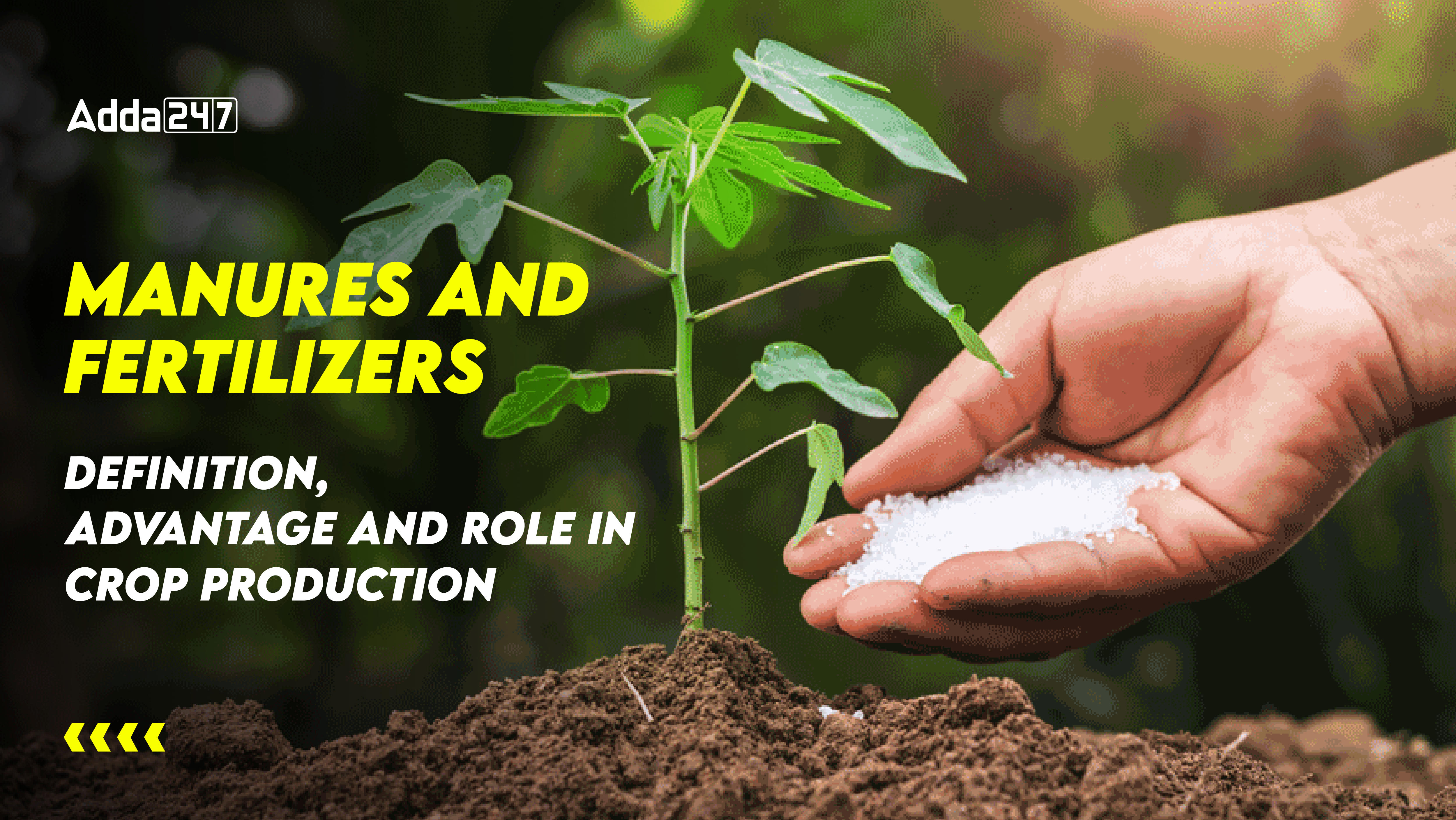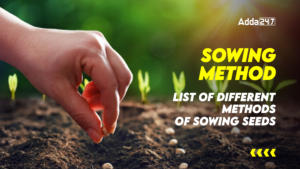Table of Contents
Manures and fertilizers are indispensable components of modern agriculture, each playing a critical role in enhancing crop production by supplying essential nutrients to plants. While manures enrich soil fertility through organic matter and gradual nutrient release, fertilizers provide concentrated doses of specific nutrients that plants require for immediate uptake and growth. Together, they contribute to sustainable farming practices by improving soil health, increasing crop yields, and ensuring efficient nutrient management.
Let’s understand their distinct roles to help farmers optimize agricultural productivity while maintaining environment and long-term soil sustainability. Let’s learn more about the role of manures and fertilizers in crop production.
What is Manure?
Manure is an organic material that is used as a fertilizer in agriculture. It consists of decomposed animal waste products, such as dung and urine, as well as decomposed plant residues. Manure is rich in nutrients such as nitrogen, phosphorus, potassium, and various micronutrients, which are essential for plant growth.
Manure can come from various sources, including livestock such as cows, pigs, and chickens, as well as from composted organic materials like crop residues and food waste. Its application rate and timing depend on factors such as the type of crop, soil conditions, and nutrient requirements, making it a versatile and valuable resource in modern agriculture.
Different types of Manure
Manures are plant and animal wastes that are used as sources of plant nutrients. They release nutrients after their decomposition. Manures can be grouped into bulky organic manures and concentrated organic manures. Different types of manure are:
Bulky Organic Manures
- Farm Yard Manure (FYM): This is composed of farm animal excreta mixed with leftover fodder and bedding material. FYM is valued for its balanced nutrient content and ability to improve soil structure.
- Compost from Organic Waste: Composting involves decomposing organic materials like kitchen scraps, yard trimmings, and crop residues into nutrient-rich compost. It enriches the soil with organic matter and nutrients.
- Night Soil: This refers to human excreta collected from cesspools or pit latrines after decomposition. It is a traditional source of nutrients in some agricultural systems.
- Sludge and Sewage: These are organic materials derived from wastewater treatment processes. When properly treated and processed, they can be used as fertilizers due to their nutrient content.
- Green Manures: These are crops grown specifically to be plowed into the soil to improve fertility. They add organic matter, fix nitrogen from the atmosphere, and enhance soil structure.
Concentrated Organic Manures
- Oilcakes: These are residues left after oil extraction from seeds, such as soybean, groundnut, or sesame. They are rich in protein and nutrients and are used as concentrated sources of organic fertilizers.
- Blood Meal: This is dried blood collected from slaughterhouses. It is high in nitrogen and is used to provide a quick nitrogen boost to plants.
- Fishmeal: Fishmeal is made from dried and ground fish, providing a good source of nitrogen, phosphorus, and other trace elements.
- Bone Meal: This is made from crushed and ground animal bones, providing phosphorus and calcium, which are essential for plant growth.
Advantages of Manure
Manure offers several advantages in agricultural practices due to its organic nature and beneficial effects on soil and plant health. Here are some key advantages of using manure:
- Natural Nutrient Source: Provides essential nutrients like nitrogen, phosphorus, and potassium.
- Improves Soil Fertility: Enriches soil with organic matter and beneficial microorganisms.
- Enhances Soil Structure: Increases soil aeration, water retention, and nutrient availability.
- Slow Release: Nutrients release gradually, reducing leaching and runoff.
- Sustainable and Renewable: Derived from organic waste, supports eco-friendly farming.
- Cost-Effective: Often locally available, reduces reliance on synthetic fertilizers.
- Promotes Soil Health: Supports biodiversity and long-term soil productivity.
What is Fertilizer?
Fertilizer is a substance applied to soil or plants to supply essential nutrients that promote plant growth and increase crop yields. These nutrients are typically nitrogen (N), phosphorus (P), potassium (K), and sometimes micronutrients such as calcium, magnesium, and sulfur, depending on the specific needs of the plants and soil conditions.
The choice of fertilizer type and application rate depends on factors such as soil nutrient levels, crop type, growth stage, climate, and desired yield. Proper fertilizer management is crucial to optimize crop productivity while minimizing environmental impacts such as nutrient runoff into water bodies.
Different types of Fertilizers
Fertilizers are industrially manufactured chemicals containing plant nutrients. Nutrient content is higher in fertilizers than organic manures and nutrients are released almost immediately. The fertilizers have three groups:
Straight Fertilizers:
- These fertilizers supply primarily a single nutrient in high concentration.
- Examples include Urea- A nitrogen fertilizer with high nitrogen content (usually around 46% nitrogen) and Muriate of Potash (Potassium Chloride)- Which provides potassium, essential for plant growth and stress tolerance.
Complex Fertilizers:
- These fertilizers supply two or more nutrients in balanced proportions.
- Examples include the 17:17:17 NPK complex- Which contains nitrogen (N), phosphorus (P), and potassium (K) in equal proportions (17% each). This balanced composition is suitable for various crops and soil types.
Mixed Fertilizers:
- These fertilizers supply two or more nutrients, but not necessarily in balanced proportions.
- Examples include Groundnut Mixture- A fertilizer blend that may include nutrients like nitrogen, phosphorus, potassium, and possibly micronutrients, tailored for specific crop needs or soil conditions.
Advantages of Fertilizers
Fertilizers are essential tools in modern agriculture, providing concentrated nutrients that plants need for robust growth and high yields. Here are some key advantages of using fertilizers:
- Precise Nutrient Supply: Fertilizers provide specific nutrients needed by plants, adjusted as per crop requirements.
- Immediate Availability: Nutrients are quickly absorbed by plants, addressing deficiencies promptly.
- Enhanced Crop Yield: Supports vigorous growth, higher yields, and improved crop quality.
- Customizable Formulations: Available in various types (straight, complex, mixed) tailored to specific soil and crop needs.
- Supports Intensive Agriculture: Essential for high-yielding varieties and intensive farming practices.
- Convenience: Easy application methods and availability make them practical for large-scale farming.
- Technological Advances: Continuous improvement in formulations and efficiency supports modern agricultural practices.
Role of Manures and Fertilizers in Crop Production
While manures enrich soil fertility and enhance long-term soil health through organic matter and gradual nutrient release, fertilizers provide immediate and targeted nutrient supplementation that supports intensive crop production and ensures optimal yields. When used in combination, manures and fertilizers contribute to sustainable agriculture practices, promoting soil fertility, crop productivity, and environmental stewardship. Let’s learn the various roles of manure and fertilizer:
- Organic manures bind the sandy soil and improve its water-holding capacity.
- Organic manures open the clayey soil and help in aeration for better root growth.
- Organic manures add plant nutrients in small percentages and also add micronutrients, which are essential for plant growth.
- Manures increase microbial activity which helps in releasing plant nutrients to available form.
- Organic manures should be incorporated before sowing or planting because of the slow release of nutrients.
- Fertilizers play an important role in crop production as they supply large quantities of essential nutrients to crops
- Fertilizers are manufactured in forms that are readily utilized by plants directly or after rapid transformation.
- The fertilizer dose can be adjusted to suit the requirement as determined by the soil testing.
- Balanced application of nutrients based on crop requirements is possible by appropriate mixing of fertilizers.
- Fertilizers are applied as straight fertilizers (providing a single nutrient) or complex and mixed fertilizers (supplying two or more nutrients) based on crop requirements.




 Types of Farming in India: Factors and I...
Types of Farming in India: Factors and I...
 Understanding Agriculture: Definition an...
Understanding Agriculture: Definition an...
 Sowing Method: List of Different Methods...
Sowing Method: List of Different Methods...


 Adda247 Job portal has complete information about all Sarkari Jobs and Naukri Alerts, its latest recruitment notifications, from all state and national level jobs and their updates.
Adda247 Job portal has complete information about all Sarkari Jobs and Naukri Alerts, its latest recruitment notifications, from all state and national level jobs and their updates.